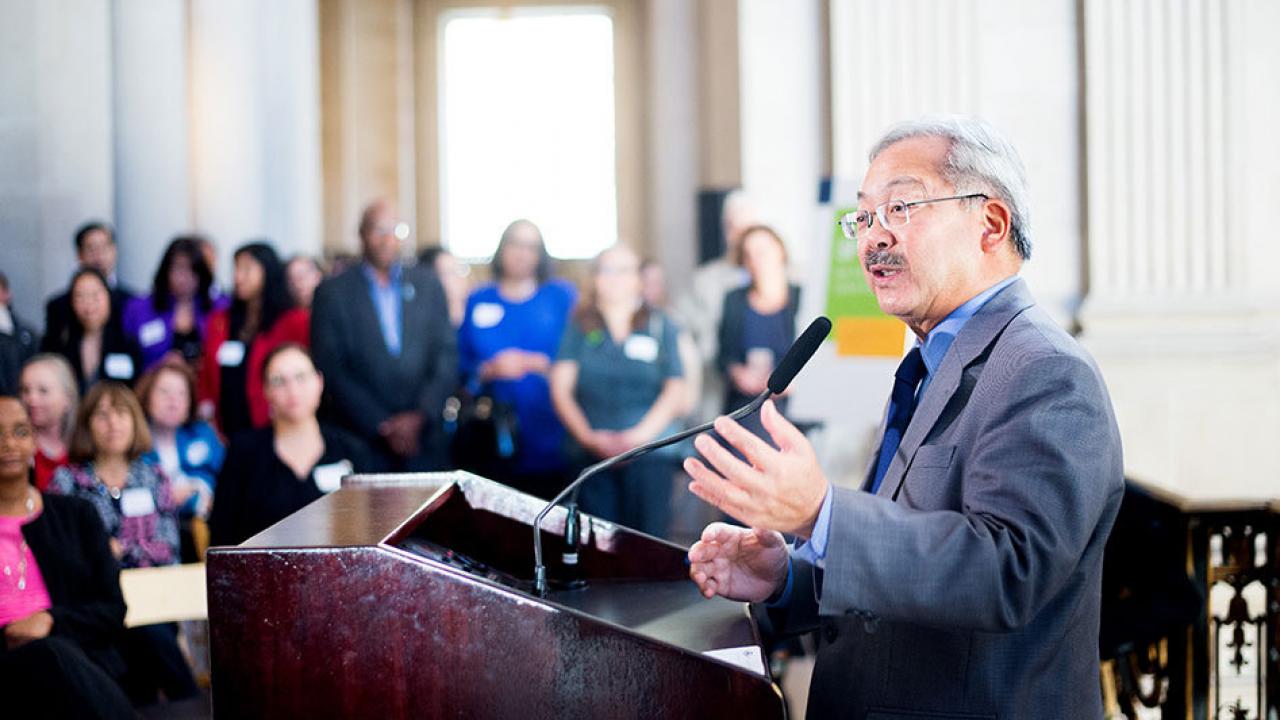
Mayor Ed Lee speaks during a launch event for the San Francisco Cancer Initiative on Wednesday, Nov. 16, 2016, at San Francisco City Hall. (Photo by Noah Berger)
Cancer is the leading cause of death in San Francisco and costs patients, families and taxpayers hundreds of millions of dollars each year. Seeing an opportunity to change this, a group that includes UC San Francisco (UCSF), the City and County of San Francisco, the San Francisco Department of Public Health (DPH), and health care and community organizations has launched the San Francisco Cancer Initiative (SF CAN), a major public health effort to reduce cancer in San Francisco.
SF CAN, conceived and supported by UCSF, aims to reduce the incidence and mortality from the most common cancers in San Francisco that are likely to be affected by known interventions or better screening. Those are prostate, breast, liver, colorectal and tobacco-related cancers. Since the majority of those cancers disproportionately affect racial and ethnic minorities as well as the socio-economically disadvantaged, a primary focus of SF CAN will be reducing inequities in prevention, screening rates, access to quality health care and overall outcomes. The initiative will address other cancers in the future.
“Someone’s ability to survive cancer should not be dependent on their socio-economic status,” said San Francisco Mayor Ed Lee. “We know that prevention and access to quality health care can make all the difference, so I’m proud to stand with UCSF, DPH, and our community health organizations as we take this important and exciting step forward in the fight against cancer.”
Collaborative Effort with Collective Impact
The initiative builds on a 2016 report by UCSF researchers that catalogued the state of cancer in San Francisco in 2013/2014, identifying the most prevalent types, the burden within different populations, risk, and disparities among diverse communities.
“A public-private partnership like this, aimed at reducing deaths, as well as cancer’s other debilitating effects on health and quality of life, is a unique and innovative plan for a major city,” said Alan Ashworth, PhD, FRS, president of the UCSF Helen Diller Family Comprehensive Cancer Center and an internationally recognized cancer scientist who will spearhead the new initiative. “The task before us is enormous, but if we implement what we know about cancer’s causes and preventing them, we could eliminate more than half of all cancers.

Jessica Jamison of the American Cancer Society applauds during a launch event for the San Francisco Cancer Initiative on Wednesday, Nov. 16, 2016, at San Francisco City Hall.
(Photo by Noah Berger)
“The city’s size, population, and history of social justice around all kinds of inequity make San Francisco an ideal place for an effort like SF CAN,” he said. “We are fortunate to be in a city with forward-thinking leadership and community groups that will work on a common cause with UCSF.”
The project is launching with a $3 million investment from a donor to the UCSF Helen Diller Family Comprehensive Cancer Center. This funding will support task forces for each of the five cancer types, creating what amounts to a cancer plan for the city.
The task forces already have begun evaluating existing resources for screening, access, prevention and education, and will develop strategies for unmet needs. Efforts underway include improving access to liver cancer clinical trials; partnerships with African-American churches to raise awareness prostate cancer screening and follow up; a translation of the SF Hep B Free website into Chinese; establishing a phone line for people with Hepatitis B, a risk factor for liver cancer; and social media and radio campaigns to reduce smoking by young people.
SF CAN’s success will rely on the power of collective impact -- tackling an intractable problem like cancer through collaboration by public and private partners. SF CAN’s partners include the City and County of San Francisco and its Department of Public Health, American Cancer Society, Hospital Council of Northern & Central California, Kaiser Permanente, San Francisco Chinese Hospital, San Francisco Community Clinic Consortium, San Francisco Medical Society, SF Hep B Free, and Project Inform. These organizations, and ones that join in the future, will leverage their existing programs’ knowledge to reduce cancer and create a new model for public health in the city.